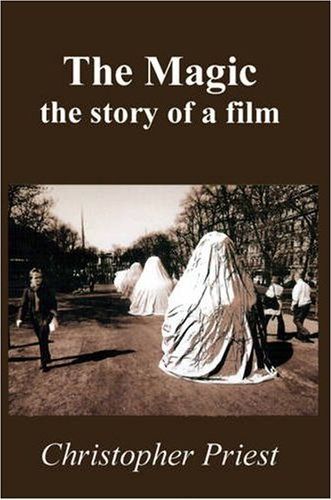 By CHRISTOPHER PRIEST (GrimGrin Studio; 2008)
By CHRISTOPHER PRIEST (GrimGrin Studio; 2008)
First off, this is not, as is misleadingly proclaimed on the back cover, “the book of” Christopher Nolan’s THE PRESTIGE (2006). Rather, it’s a book about that film, written by the author of the similarly titled 1995 novel that inspired it.
Christopher Priest here fills us on the writing of what initially seemed an “ill starred” novel. He also reveals that Nolan optioned THE PRESTIGE for film numerous times, ultimately waiting until he finished 2005’s BATMAN BEGINS to begin work on it. Priest, a veteran science fiction writer who never had a book adapted for the screen prior to this one, was excited about the movie but had zero involvement in its production, being forced to rely on Google alerts to find out what was happening.
Nolan, it seems, was obsessed with keeping a twist ending under wraps, and so cloaked the making of the film in secrecy. The problem was that the twist in question wasn’t at all difficult to foresee, hinging on a secret the novel wisely treated as a part of its overall tapestry rather than a show-stopping revelation. Another of the film’s problems was with Nolan’s elimination of the present-day wraparound Priest gave this late nineteenth Century set account, which led to a frequent criticism of the film: why exactly should we care about a rivalry between two magicians (Christian Bale and Hugh Jackman) in the 1980s?
Priest, ironically enough, doesn’t have a problem with the changes made to his conception. As he makes clear, “It is incontrovertibly Nolan’s film, but I have the novel to myself.” Included is a detailed analysis of the film, which for the most part Priest quite likes, claiming that “In the future I believe it will come to be recognized as a great classic of cinema, standing comparison with many of the acknowledged masterpieces of the past.”
THE MAGIC is an extremely slight book overall, but it has value for anyone with an interest in literary adaptations, and also the ways in which post-2000 films are made and marketed. In the latter category is Priest’s dead-on analysis of the critical response to the film. “Endlessly formulaic and repetitive” is his summation of the PRESTIGE reviews, which were apparently “quickly written journalistic pieces…drawing heavily on the material in the press kit,” and that “Except in one or two exceptional cases original observations about the film, or insights into it, were all but nonexistent.” That of course describes the critical response to just about any modern movie you can think of, and Priest deserves credit for pointing it out.
